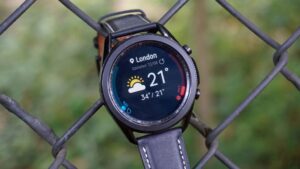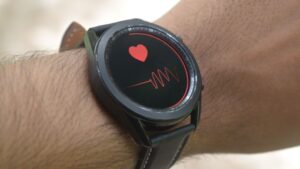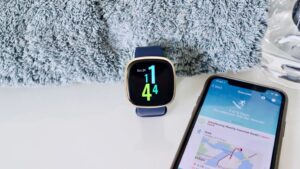
Cast your mind back to 2014: Wear OS was still Android Wear and the Apple Watch, or the iWatch because it was being known as, was still roughly a yr away from being formally unveiled. The Samsung Gear Live was one of the two launch devices that represented Google’s ambitions to live on our wrists.
Just six months later, Samsung pushed out the Gear S that ran on the company’s personal Tizen software slightly than Wear OS. There would possibly have been away that Samsung was hedging its bets and backing two horses to see which of the 2 took off. The reality we didn’t see one other Samsung Wear OS smartwatch after the Gear Live speaks volumes though.
Fast ahead to 2021 and we are nonetheless having a number of the same gripes about Google’s Wear OS, whereas Tizen has discovered itself packed into a number of the greatest smartwatches you possibly can put in your wrist proper now. That’s why talk of Samsung doubtlessly swapping Tizen for Wear OS fueled by Samsung insider Ice Universe’s recent Twitter post doesn’t seem to make a lot of sense to me.
In its present state, it’s a struggle to see what Wear OS is really doing extra impressive issues and for the options that are working higher, it’s taken for much longer for Google to get them to a degree the place they really feel enjoyable and unproblematic to use.
On the flip aspect, Samsung has simply launched two of its best smartwatches within the Galaxy Watch 3 and the Galaxy Watch Active 2 and a giant a part of why they’re the very best and most critiques say it’s the best smartwatch option for Android customers, is that Tizen is a at present a much better fit for the wrist.
Tizen vs Wear OS
I’ve tried to look at what Samsung could gain from Wear over Tizen and it’s arduous to see what there is right now. Samsung’s software is simpler to use, for starters. It’s effectively optimized for smartwatches and crucially, it’s executed a much better job of bringing enhancements and enhancements to its personal platform. Even stretching again to older models. It’s not good, nevertheless it does do a number of issues right.
Can the same be said about Google? The downside of getting so many different watches that run its software is that fragmentation creates issues. It appears like when one thing new does arrive on a software replace, it’s going to be tremendous on some Wear OS watches and botches a number of others within the course of. The lengthy working subject people have been experiencing with Google Assistant is only one instance of this.
One of the longstanding and largest criticisms leveled at Tizen is the extent of app assist on supply. It nonetheless largely pales compared to what is provided for Apple Watch and Wear OS customers. There’s a much bigger debate available that really smartwatch platforms have to get get their native apps that come put in in better form.

Samsung by and huge do a good job on this entrance. Samsung Health is not good, but it’s a step up from Google’s messy collection of Fit apps. Samsung has huge third party apps like Spotify that are well built-in into the expertise and affords good offline assist options. Google may well have the higher hand in the case of sensible assistants (sorry Bixby, you’re a mess), however really the Google Assistant assist on Fitbit’s smartwatches is rather more pleasing than it is on Google’s own Wear OS watches.
Samsung is bolstering its health and fitness options in a giant manner too. It has some of the greatest health monitoring options you will discover on a smartwatch and it’s trying to supply distinctive options for sports monitoring too. It’s put ECG in its smartwatches, is the first to offer blood stress monitoring and while they are very a lot still rumors, could even be looking to remedy a holy grail for wearables by delivering glucose monitoring.
Samsung nonetheless makes us download plugins after plugins to get issues arrange and makes it and the expertise clearly favors Samsung phone users over iPhone ones, however issues usually simply work when that’s all out of the way.
Getting closer to Apple
What might drive a potential switch is an attempt to play catch up with who is dominating the space. Apple led the market according to the latest data from analyst firm IDC’s most recent Worldwide Quarterly Wearable Device Tracker.
Xiaomi, Huawei and Samsung followed in that shipments list. Fitbit took fifth spot.
Fellow analysts CCS Insight latest data suggests Google’s Wear OS accounted for just 3% of sales in 2020. That doesn’t make good reading for Google.
That positioning of Fitbit though and Google’s acquisition of the wearable tech heavyweight now lastly completed may be something that has prompted Samsung to look within the path of Wear once more.
In simply a short time, Fitbit has proven it can do a number of things better than Google and Wear OS. Battery life, common performance, health and health tracking and, as mentioned, far better smart assistant integration.

It’s arduous to know if the influence of the acquisition is going to be felt instantly although. You would possibly well be capable to buy Fitbit units on Google’s retailer proper now, however does that imply it’s making its mark behind the scenes already? It’s arduous to inform.
Samsung might also see that Google has seemingly started to loosen the reins from the as soon as agency grip it had on the way Wear was presented on all smartwatches that ran on it.
It’s now let Suunto, Oppo and even Mobvoi with its latest TicWatches, offer more of their own software thrives and it’s been a positive move in most respects.
It’s additionally in some respects made it really feel at times like you’re using a smartwatch with a software damaged into two. Using a Suunto 7 with Suunto software and Wear felt a bit messy. With the Oppo Watch and the most recent TicWatch Pro 3, it was hard not to favor the software parts placed on by the {hardware} makers over Google’s.
Ultimately, there appears like there is extra to lose than gain here from making that swap. Samsung’s Tizen feels prefer it’s in a stronger place than Wear despite some rocky early years for the platform. Samsung will have to have seen one thing actually special on the horizon for Wear to depart Tizen behind.